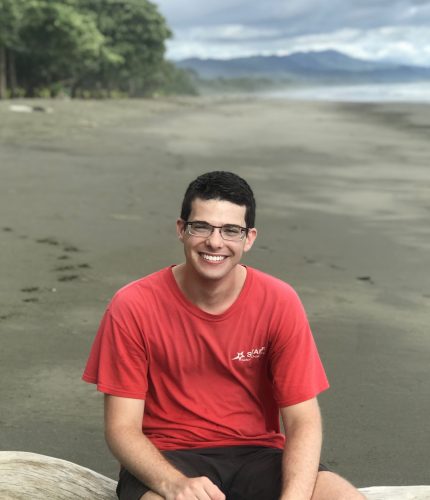Alon Millet’s time at Yale has been defined by his love of sharing and seeking new knowledge. Image courtesy of Millet.
No one can capture themselves in three words—let alone someone who juggles writing a master’s thesis, giving campus and science tours, and peer tutoring for the introductory biology sequence for the sixth semester. But when asked about it, Alon Millet (BR ’20) rose to the challenge: greedy for knowledge.
“What’s amazing about biology is that you can start at the atomic level with biophysics and scale up to systems biology, which is my field. Every step along the process, you can see subtle connections as the scale changes,” Millet said. Drawn to the unsolved mysteries in biology, he satisfies his curiosity in the lab—probably even more than in the classroom—a habit that started during his freshman year of high school. Looking for a “nice side thing to do,” he joined his high school’s cell biology lab on a whim. After designing his first set of experiments, however, Millet knew that research would not only become a full-time commitment but also a lifelong one. He dedicated every spare second to tackling a daunting challenge: addressing the global food insecurity crisis. His solution of a plant steroid—specifically, a seed coating that increased the agricultural yield per plant—earned him meetings with Barack Obama and Bill Nye, a patent, and the opportunity to work with the U.S. Agency for International Development.
After four years focused on research over conventional high school experiences, Millet gained the confidence and initiative to join a lab within a week of his first year at Yale. He hit the ground running, ready to go all-in on research through the BS/MS track for Molecular, Cellular and Developmental Biology. Halfway through his sophomore year, he co-authored his first publication in Science Immunology.
But his end goal of research extends beyond publications. He finds fulfillment from saying yes to two questions: if he learned something new, and if he satisfied his curiosity. The possibility of reaping new knowledge, and perhaps the thought of a few lines in the next edition of a biology textbook, keeps him motivated. “If I’m on a question, maybe I can be the person who cracks it. If I stopped, I would never know the answer,” Millet said.
The next big step for Millet is his master’s defense. His thesis focuses on his research at the forefront of cancer immunology, in Professor Sidi Chen’s lab. He is working to understand how the metabolic state of immune cells influences their response to tumors. This work holds the potential to open undiscovered therapeutic avenues, as insights about immune cell metabolism can be translated into new approaches in cancer immunotherapy.
In April, Millet will present his thesis to a committee of illustrious scientists: Nobel laureate James Rothman, Mark Mooseker, Tom Pollard, and Sidi Chen. “It’s not every day you have a Nobel laureate on your thesis committee. But beyond the fact that they’re incredible scientists, they have been unbelievably supportive whether I struggled with the actual science or more personal issues,” Millet said. He says this is a rare find: scientists who are doing world-class work and want to train the next generation of scientists who could be doing that world-class work. And he does not take this mentorship for granted.
Guided by the desire to follow in their footsteps and invest in the development of others, Millet has the long-term goal of becoming a professor. Next year, he will attend the Tri-Institute PhD Program in Computational Biology and Medicine. Meanwhile, he has taken up peer tutoring for the introductory biology sequence as an intermediate along the path of academic mentorship. “I have given some great tours and have done some good science in the lab. But out of all the things I’ve done on campus, I think the one I’m proudest of is being a peer tutor and how I have peer tutored,” Millet said. He finds excitement in bonding with students over encountering new information and reliving his experience of learning it for the first time. At his many late-night review sessions, his passion is palpable as he discusses biological principles, experimental design, and his legendary mock exam questions in front of over a hundred students.
For Millet, the connections he has formed with students are more than channels to share knowledge. He hopes that they have become avenues to transmit his love for biology and greed for knowledge—his way of paying the favor forward.

